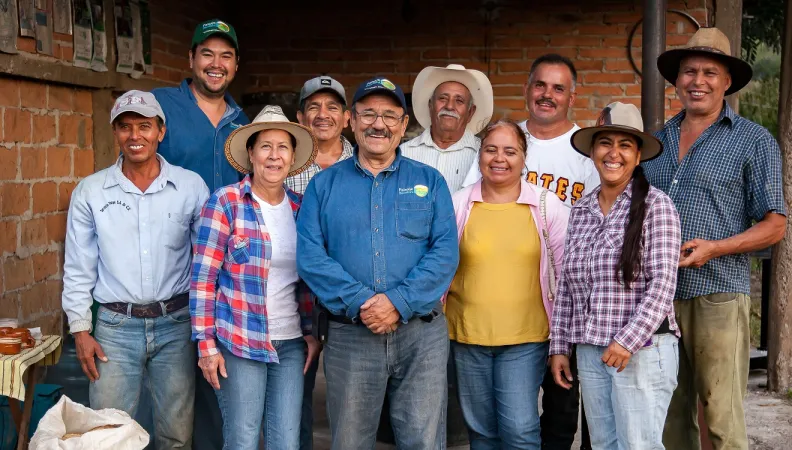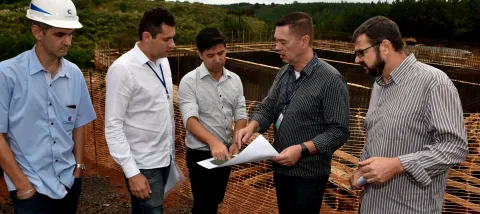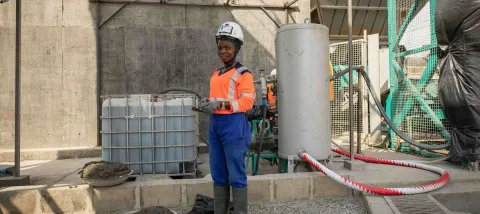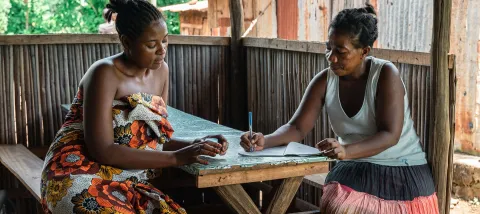Share the page
How AFD Ensures that its Financing Reaches the Final Beneficiaries
Published on

The projects financed by Agence Française de Développement are subject to ongoing attention. This involves a dialogue with its partners on almost a daily basis, supervision missions in the field, and regular and independent audits and evaluations. The objective is to ensure that the development programs effectively reach the intended recipients.
New projects amounting to almost €9 billion financed by Agence Française de Développement (AFD) in 2023 and 2,700 projects under implementation in more than 150 countries… Such a high volume of financing for projects working towards the United Nations’ Sustainable Development Goals (SDGs) calls for a high level of vigilance with respect to the final destination of the funds.
Throughout the project monitoring process, AFD uses various means to ensure their proper implementation. Because there are risks – corruption, money laundering, terrorist financing, project sites that never get off the ground, and beneficiaries poorly identified or adversely affected by the project.
To protect itself against these risks, AFD has built a multi-level control system over the years. “We have three main types of procedures which enable us to ensure that the funds reach the intended final beneficiaries. We ensure that the objectives are developed jointly with the counterparts, we carefully manage the fiduciary risk, and we conduct operational monitoring of the projects,” says Mathieu Boche, Unit Manager at AFD’s office in Dakar, in Senegal.
These procedures are combined with other safeguards, including the possibility of conducting an independent evaluation, either mid-term or at project completion, redirecting projects that go off track, or we can receive complaints directly from the project areas.
Find out below how AFD ensures that its assistance reaches the beneficiaries.

Defining the right objectives
Prior to being launched, all projects are discussed between the partners, who express a need and make a request for financing, and Agence Française de Développement. AFD has a wide array of partners, including governments, local authorities, financial institutions, public enterprises, NGOs, and foundations. They all have demonstrated competence in their field of action and are subject to a thorough screening process.
The appraisal work then begins, from the concept note to the description of the entire program envisaged. Feasibility studies are conducted where necessary. The objective is to ensure that the project objectives are clearly defined and that the tools are deployed. Once these aspects have been validated, they are set out in the financing agreement.
AFD conducts a sustainable development analysis on each project. The expected results are analyzed on the basis of six cross-cutting dimensions (biodiversity, climate, social link, gender, governance and economy), covering the 17 Sustainable Development Goals. The purpose of this analysis is to improve the identified effects. A “sustainable development opinion” is also delivered by a department that is independent of the operational departments. The objective is to inform the decisions of AFD’s governing bodies, with the exception of certain categories of project. For example, it may recommend targeting certain geographical areas, or more clearly identifying the final beneficiaries.
“Managing the environmental and social risks also requires a more or less thorough impact assessment, depending on the level of risk. The objective is to assess and avoid the negative effects on the environment or communities,” says Delphine Queffelec, an environmental and social expert at AFD.
Before the financing is approved, the competent departments also look at aspects related to the legal, credit, compliance, corruption, money laundering and terrorist financing risks. Each project thereby benefits from a number of analyses, enabling it to be developed to maximize the positive effects, while mitigating or preventing any negative effects.
 © Zuleika de Souza / AFD
© Zuleika de Souza / AFD
Ensuring the proper use of funds
Once the project has been launched, AFD ensures that the sum paid to the partner is effectively used for the planned activities. The operations are monitored on a daily basis by AFD’s field offices – they have ongoing exchanges with the project owners, in particular when AFD issues its opinions at the key stages of the procurement process and when the disbursement of funds is controlled. The projects are also very often subject to technical and financial audits by external consulting firms during their implementation.
AFD is particularly vigilant with regard to compliance with the principles of transparency and openness to competition. It requires the various project stakeholders to have high standards in terms of ethics and environmental and social responsibility. The partners are initially informed about the general principles of the tendering rules. They are also given access to an e-learning platform where they can learn about the procurement phases for the contracts financed.
“For partners whose reliability hasn’t been ascertained or in sensitive countries, we make direct payments to the companies providing services for the project, once the contracting authority has validated their invoices, as well as the consultants responsible for the supervision when there are works involved,” says Thomas de Véricourt, Task Team Leader at AFD. “If there is a sufficient level of reliability, especially for program approaches, we can also pay an advance to our partners on a bank account dedicated to the project, which enables us to conduct an audit-based control. In other more special cases, the partners pay and we reimburse them upon presentation of invoices. In any case, we can add additional audits where necessary.”
 © Falihery-Francisco / AFD
© Falihery-Francisco / AFD
Monitoring the progress of projects
Following the launch of a project, AFD’s teams monitor its progress through implementation reports regularly submitted by the contracting authorities, supervision missions in the field, and reports provided by specialized consultants or technical assistants, which make it possible to verify whether the commitments have been implemented.
“We have exchanges with our partner counterparts on an almost daily basis and we ourselves go to the project site at least twice a year,” says Mathieu Boche from AFD’s Senegal office. “It also means that we can discuss with the final beneficiaries and identify any problems.”
Because very few projects go exactly as planned! Projects can be redirected where necessary – activities are changed, the implementation methods are reconsidered, and the objectives are reviewed.
“We financed an on-site sanitation program in Dakar which took more than a year to start. During a supervision mission, we ended up identifying an arrangement to provide the technical assistance needed by the contracting authority, which enabled us to unblock the project. What matters the most is to move forward with partners and stakeholders, so that we can come up with solutions on a daily basis and maintain a strong impact,” says Mathieu Boche.
Project supervision is a matter of teamwork at AFD, generally with three people – an officer in the local office, close to the ground, who is in contact with the partners and contracting authorities and ensures that the financing agreements are respected; the task team leader, who provides their technical expertise, mobilizes internal and external expertise, issues the main “No Objections,” and conducts periodic missions in the field; a country director who is responsible for the overall management of the financial allocations. These officers mobilize a combination of internal and external technical expertise to ensure that the project is properly supervised.
 © Esther Ruth Mbabazi / AFD
© Esther Ruth Mbabazi / AFD
Responding to environmental and social complaints
Despite our best efforts, situations may arise whereby physical damage is caused, people are adversely affected, or activities do not go as planned. To ensure that no final beneficiary is penalized, AFD has a complaints management system concerning environmental and social impacts. It is managed at two levels.
Firstly, certain projects have a hotline and a focal point identified among the communities concerned through which they can express grievances. Any grievances are handled by the contracting authority and reported to AFD in the supervision reports. An amicable settlement of the problem is envisaged in certain cases.
If a solution to the harm suffered is not found at this level, it is possible to directly refer to Agence Française de Développement, by e-mail or via an online form. “We guarantee a right of recourse to the communities affected. If the complaint is well-founded, we can launch a conciliation procedure and a compliance audit. The objective is to find remedial solutions for projects and be in a process of continuous improvement, through a commitment to make progress with their implementation,” says Mélanie Corbe, who manages environmental and social complaints at AFD.
 © Falihery-Francisco / AFD
© Falihery-Francisco / AFD
Evaluating completed projects
When a project reaches completion, AFD’s operational teams systematically assess the inputs, outputs and outcomes in a completion report. A project evaluation may subsequently be conducted to gain a better understanding of what has worked well and what has worked less well. For example, the purpose can be to improve the following phase or understand the effects of an innovation.
The evaluation may be planned in advance for the project in the project budget, or decided at its completion following discussions between the Evaluation and Learning Department and the technical divisions, the Regional Offices, the relevant French administrators or institutions, and, of course, the beneficiaries and contracting authorities.
Approximately 50% of completed projects are evaluated. “This target is in line with international good practice applied by donors. Our approach is to only evaluate a project when the lessons we can learn will help improve our action,” says Jean-Claude Pires, Director of the Evaluation and Learning Department at AFD.
A project may also be evaluated mid-term or ex post, meaning about two to three years after its completion to measure the longer-term effects. “What matters is to answer the right questions at the right time. That’s why we customize our evaluations,” says Jean-Claude Pires.
Because AFD has three other types of evaluation:
- Broad-scope evaluations: They focus on a theme, a sector, a geographical area, or a financial instrument. They are generally broader-based and cover a longer period than project evaluations. These evaluations can also focus on sectoral, geographical, or cross-cutting strategies, such as gender or the climate. For example, AFD has recently conducted an evaluation of how climate change adaptation issues are taken into account in water and agriculture projects in Africa and Madagascar, which covered a sample of 35 projects
- Capitalizations: They are based on the conclusions of evaluations or analytical reviews and the experience of stakeholders. They primarily target action with a collective dimension, on the scale of several projects. They thereby provide operational teams with new perspectives on their practices
- Scientific impact evaluations: They aim to measure the improvements strictly attributable to one of the projects supported by AFD. In view of the current lack of knowledge about the effects of development action, this type of evaluation uses approaches based on social science research. Given the specific nature of the methods used, these evaluations focus on a single aspect of a project, rather than on all the results associated with it
These evaluations are generally entrusted to external consultants. Most of them are subsequently made public through their publication on afd.fr, in AFD’s ExPost collection, or in scientific journals.
Read AFD’s Evaluations Report 2023
